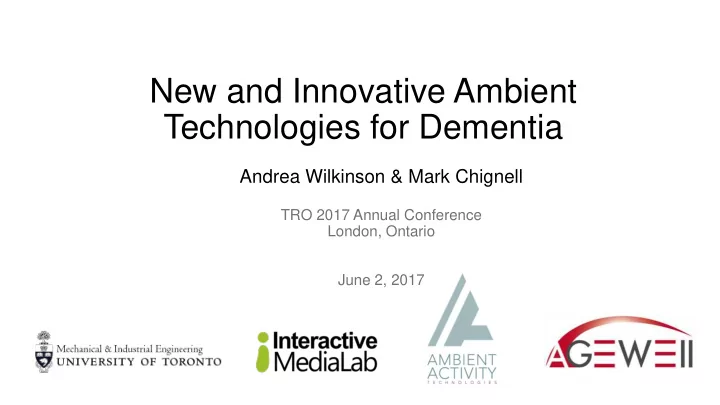

New and Innovative Ambient Technologies for Dementia Andrea Wilkinson & Mark Chignell TRO 2017 Annual Conference London, Ontario June 2, 2017
Background: What is dementia? • Not a part of normal aging • Progressive neurodegenerative brain disorder • Symptoms • Memory loss • Difficulties with thinking, problem-solving or language • Severe enough to reduce a person's ability to perform everyday activities
What Goes
Not Giving Up • Yes, brain function is diminished and there are severe problems • But we need to build on what remains. • There is still a capacity to enjoy • There is still an ability to learn, if we use the parts of the brain that remain available
What Stays? • Emotions • Motor Control (in many cases) • Reinforcement/Implicit Learning • Reward Seeking/Enjoyment • Sensing • Learned skills (procedural/automatic) • Dancing • Playing piano • Reading
What is the problem we are trying to solve? Responsive Behaviours • 46% of residents exhibit some level of aggressive behavior (screaming, hitting, wandering); on the rise (www.oltca.com) • The need to attend to agitated behaviour is immediate, 24/7, takes priority • It is time and resource consuming, stressful, disruptive to the environment • Burden on residents & staff
Responsive Behaviours in LTCs • Pharmacological intervention • Overprescribed • More than 40% of people with dementia taking anti-psychotic medications • Expensive: $38m annually • Side effects: falls, stroke, death • Push in Canada to reduce use of inappropriately prescribed anti- psychotics (www.cfhi-fcass.ca) • Medicalized view: Treatment of symptoms not underlying cause of distress (Penrod et al., 2007)
Unmet Needs • Problem behaviour is an expression of an unmet need (physical, social, emotional) • Ideal solution • Uncover root cause of behaviour • Individual characteristics (health conditions, personal history) and environmental triggers • Problem • Communication becomes increasingly difficult as dementia progresses • Facilities are often under staff • Our technological solution… (Penrod et al., 2007)
Solution: Technology to help with the management of responsive behaviours in LTCs AMBIENT Available in the environment for easy access AUGMENTING Existing programming and activities ACTIVITIES Provide anytime access to engaging activities
Person-centred Care • Person centred-care in dementia • Activities that were related to an individuals’ background resulted in • More engagement • More positive affect • Fewer responsive behaviours (Buron, 2008 – as cited in Nowell et al., 2013; Penrod et al., 2007)
The Need for Learning • As dementia progresses • Creating new explicit memories becomes impossible • We need to utilize the implicit memory system • Implicit Memory uses different brain processes at the relatively unaffected back of the brain
Developing Usable Activities • 1-1 continuous support by caregivers trained in Montessori principles and beh management • Ideal, but costly and impractical • The Design Opportunity • 24x7 available ambient activities in the environment • Linked to beh management systems • Desired Outcomes • Retaining functions otherwise lost • Creating engagement • Improving well-being
The Research
Research Questions 1. Do ambient technologies increase meaningful engagement with target activities? 2. Does the use of ambient technologies decrease responsive behaviours, and use of anti-psychotic medication? 3. What impact does ambient technology have on cognitive and emotional status? 4. What is the impact of ambient technology on staff and family (e.g., satisfaction and system usability)?
Methodology • Participants • Residents, Staff, Family Members Residents Staff Family • Agitation • Strain • Visitor Satisfaction • Aggression • Burnout • System Usability Scale • Depression • Approaches to Care • Activities of Daily Living • Satisfaction • Quality of Life • System Usability Scale • Cognition • Anti-psychotic Meds • Activity Levels • Positive Emotions
*Control group Methodology: Design Aug. 2017 Mar. 2017 Posttest Posttest Posttest 1st 2nd 3rd Pretest Intervention Month Month Month T2 T3 T1
Acknowledgement This research is funded by the AGE-WELL NCE Trainee Award Program.
Recommend
More recommend